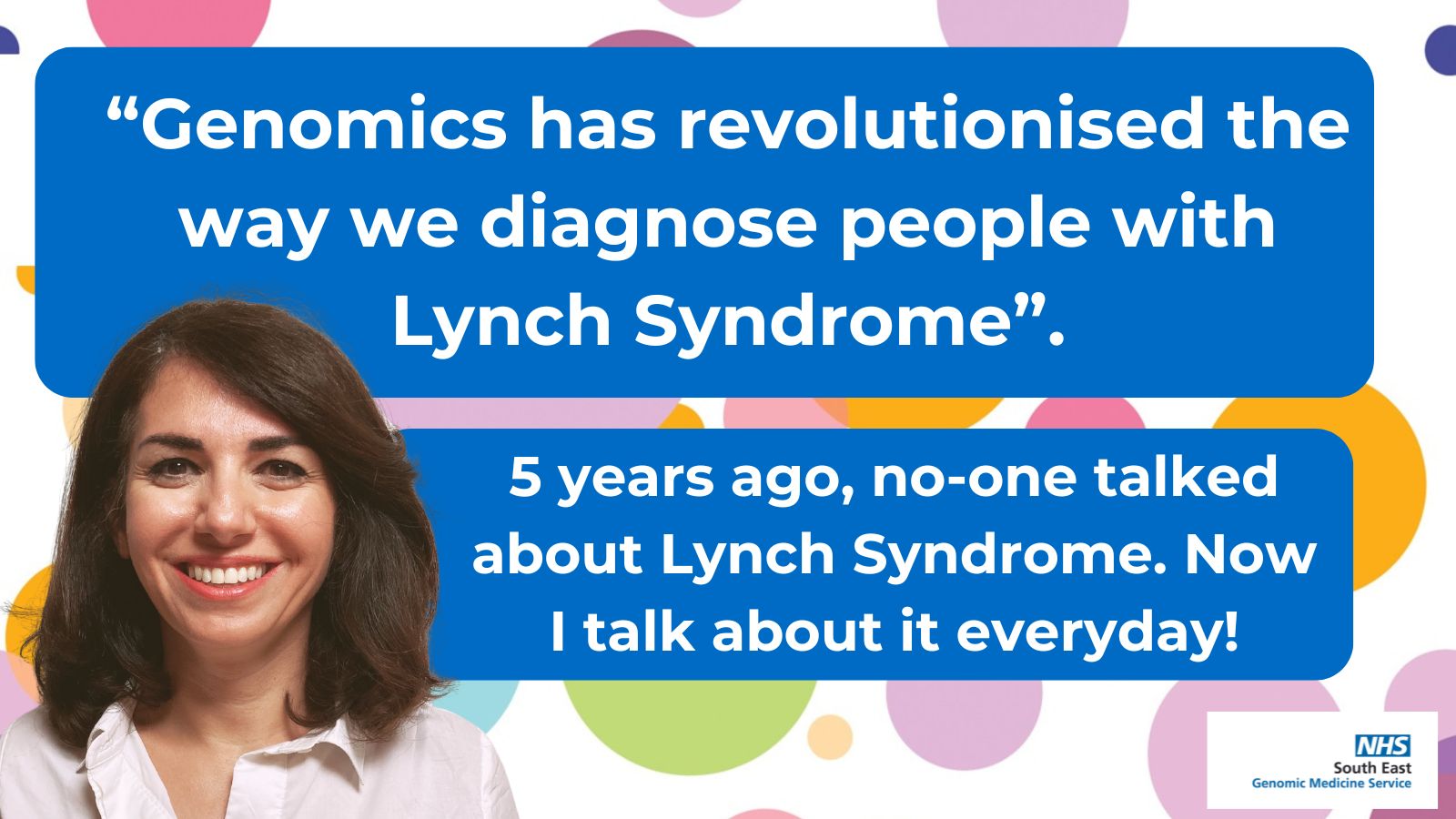
A few years ago, Lynch Syndrome was rarely mentioned amongst cancer teams. Today, NICE guidelines recommend that all patients diagnosed with colorectal and endometrial cancer undergo genomic screening for Lynch Syndrome.
Here, Dr Dimitra Repana from St. George’s Hospital in London discusses her efforts to raise awareness about Lynch Syndrome.
“I am an Oncologist specialising in the treatment of colorectal cancer and cancer genomics. I divide my time between Oncology and the Cancer Genetics Department at St George’s Hospital. I learnt a lot about genomics during my PhD, but I was aware that many colleagues were not as familiar with genetic testing. I wanted to help remove any barriers, and make it easier for cancer teams to refer patients for genetic testing.”
Dimitra’s work at St George’s Hospital, which is a regional Clinical Genetics centre serving a population of 4 million people in South West London, has meant that more people are being now being referred for screening and consequently being diagnosed with Lynch Syndrome. Lynch Syndrome is a genetic condition that increases your risk of developing cancers, particularly colorectal and endometrial cancer. People with Lynch Syndrome are also more likely to be diagnosed with cancer at a younger age, and often develop more than one cancers during their lifetime.
Following her early success, Dimitra extended her work across the South East region raising awareness of Lynch Syndrome amongst cancer teams and ensuring their patients receive the necessary genetic testing.
“It’s very rewarding to see how much progress we have made. Until recently, patients with colorectal and endometrial cancer were not routinely screened for Lynch Syndrome. This lack of testing meant that patients were missing out on risk reducing measures such as bowel screening, prophylactic surgery or the option to take aspirin. Patients also tell us that knowing they have Lynch meant that they were more likely to act on their symptoms. Moreover, as Lynch Syndrome is an inherited condition, their relatives were missing the opportunity to be get tested.”
Five years ago, there were no discussions about Lynch Syndrome. Now I talk about it every day!
While having Lynch Syndrome can increase your lifetime risk of developing bowel cancer by up to 80%, knowing you have Lynch Syndrome has many advantages. Regular screening with colonoscopies, now integrated into the National Bowel Cancer Screening Programme, enables early detection of suspicious changes.
“Knowing that a patient has Lynch Syndrome has prognostic and predictive value and helps us Oncologists with our treatment decisions. Tumours associated with Lynch Syndrome are more likely to respond to novel immunotherapies, which can offer our patients the best chance for survival.”
Dimitra works closely with Cancer Alliances across the South East region as well as the national team. Today, 95% of Colorectal and Endometrial MDTs in England have a dedicated Lynch Champion to ensure equitable testing for all patients. The next goal is to speed up Lynch screening by supporting individual hospital trusts to deliver genetic testing locally.
We are nearly there! We have been training cancer teams across the South East and supporting them in setting up local testing.
“Currently it can take around 12 months for a patient with cancer to receive a Lynch diagnosis. Local genetic testing will significantly reduce that wait. Everyone I have spoken to is keen to get it up and running; the challenge is finding the time on top of everything else.”
Approximately 175,000 people are believed to have Lynch in the UK, but 95% of them unaware of their condition. Identifying these people is a top priority for the NHS, as it will lead to earlier cancer detection and improved outcomes.
We all want the best for our patients! That is why we all need to know the basics of genomics.
Dimitra has a simple message for colleagues who want to learn more about Lynch and genomic testing. “Join one of our many training sessions to learn about Lynch and its impact on your patients. After that, you will be hooked! We can all work together to ensure our patients receive the best possible treatment.”
